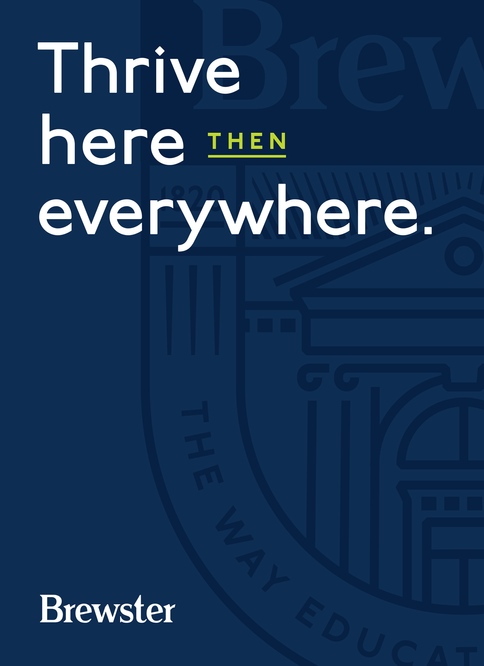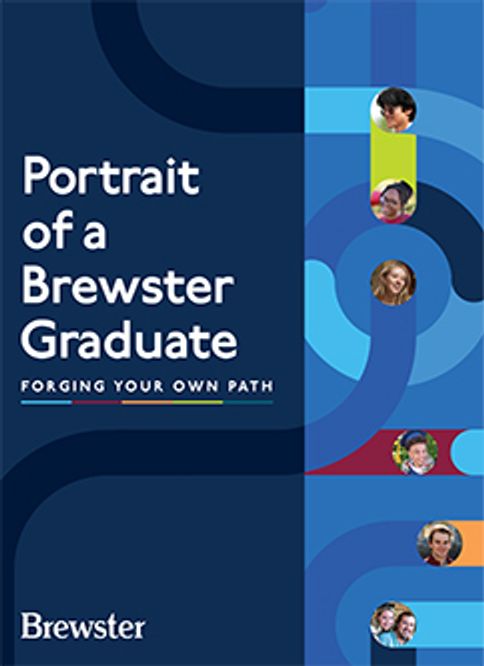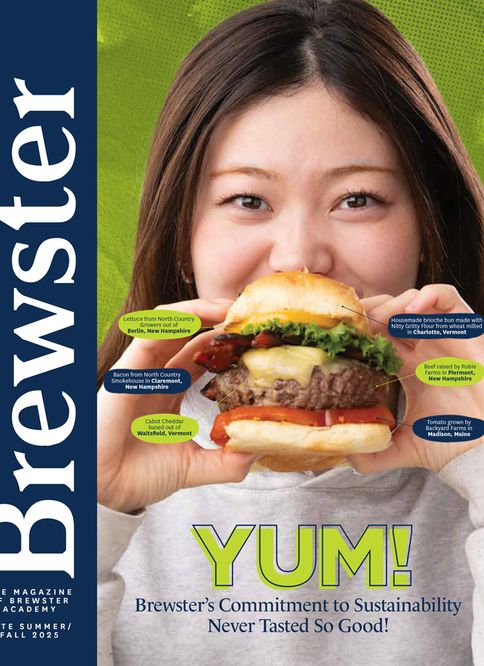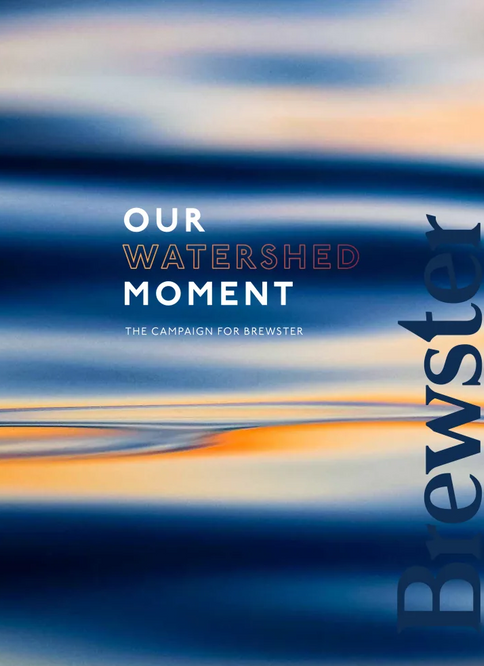
Thank you, Mr. Curvey

As Brewster celebrates a milestone for the James C. Curvey Scholar programs, we sat down for a wide-ranging chat with its benefactor. The first part of our Q&A appeared in the Summer 2024 issue of Brewster magazine, and this feature dives deeper with Mr. Curvey on what motivates him to support education in such an impactful way.
Many in Brewster’s community know the inspiring story of Mr. James Curvey, either from reading about his growing Curvey Scholar Programs, or from enjoying his 2018 book, Our Jim: From the Coal Mines of Pennsylvania to the Board Rooms of Boston. He comes from a line of hard workers: Dad left 6th grade to work to support his family. Mom wanted to be a nurse, but didn’t have the funds to get the degree. As a couple, they modeled a strong work ethic for their own family. Mr. Curvey admits that in high school he majored in “sports and girls,” but when he landed at Villanova University, his life changed forever. Young Jim became a disciple of hard work paired with education—the key to building the life he wanted. And now, decades later, he has used his personal success to build a program like no other at his college alma mater and Brewster, a school with which he had no personal connection other than wanting to provide top-drawer educational experiences for students in the Lakes Region (his summer home). As Brewster celebrates the 15th year of students benefiting from his largesse, vision, and involvement, we checked in with Mr. Curvey on a wide range of topics.
Q. Can you share with readers how the idea for the Curvey Scholar Programs came about?
A. I was on the board at Villanova for 10 years, and we were involved in raising a lot of money. The idea of naming a building after me came up and that just didn’t turn me on. The long and short of it was I’ve always been interested in education, and it occurred to me that I come from this pretty poor part of Pennsylvania, maybe I should do something for the kids there. We came up with very simple requirements. First of all, you have to have a financial need. Secondly, you had to come from the high school where my wife and I graduated, and you must be accepted by Villanova.
Q. And that was the model you followed for Brewster?
A. Yes. We have a home up there and have been visiting New Hampshire for 35 years. We came up with the same requirements as Villanova: students must have a financial need, be accepted by Brewster, and in this case, come from the Lakes Region. Simple, straightforward.
Q. One of the unique aspects of your work at Brewster is the levels of support you offer students. First there is a scholarship to attend Brewster, then there is an opportunity to travel in the U.S. or Canada with your fellowship, and on top of that, you’ve added a scholarship for a Brewster student to attend Villanova. And in the last year you added another unique layer.
A. Yes, one of the things that makes this program successful and unique is the fact that at Villanova, and now at Brewster, I’ve endowed a position. So there’s a full time person at Brewster, Lynne Palmer, to make this thing work every single day, because I couldn’t do all this stuff myself.
Q. And yet many years of Brewster’s Curvey Scholars are quick to say that your personal involvement has meant a great deal to them.
A. Well, yes. I’ve stayed involved—we have reunions when the alumni come back and the current students are there with their parents and sometimes grandparents—that’s wonderful. Here is one of the key principles about this: I wanted to give money to something, but giving money away intelligently is really hard. I wanted to be personally involved, and I think that does make all the difference. And it’s modeling for everyone in the program what one person can do—that’s an important part of it, too.
Q. Can you tell our readers more about why education is so important to you?
A. Education has always been important to me, and that’s based on my mother and father—and whatever little success I've had in life has to do with education. [Mr. Curvey is being modest; his “little success” in life includes being the President and COO of Fidelity Investments.] As I’ve said many times, Villanova was life changing. From there I went into the Army, came back and wanted to go to law school. I went to Georgetown Law for about three weeks at night. And I hated every minute of it. But here I was, and even though that didn’t work out, I ended up going to George Washington University at night, got a Master’s degree, and that Suzanne Morrissey helped me along.
Q. You did well working in the civil service system in D.C. Even being named as one of the “10 Outstanding Young Men in Washington,” correct?
A. Yes. And after leaving D.C. I ended up working for David Rockefeller in New York at the Chase Bank. And after six years in New York, I made the move with my family to Boston, and spent more than four decades there. And the underlying principle here is that education opened all kinds of doors for me.
Q. And now you’re giving others the chance to open doors the same way, and staying so close to the Curvey Scholars as they make their choices. That must be very gratifying.
A. Oh, yes. In fact, I just got an email the other day from one of the students at Villanova, can I read it?
Q. Of course!
A. So this is from a young man at Villanova. He's a really, really smart kid. And he says, “Hi, Jim and Jeff.” [At this point, Mr. Curvey paused to explain that his son Jeff is his backup point person at Villanova, while his son Scott is the same for the Brewster programs.] So he says, “Hi, Jim and Jeff, I hope this email finds both of you well. It's been a while since I had a chance to check in with both of you. And I wanted to see how things were going in the process of writing and the reflection for my fellowship trip last summer. What a great time that was. And it has me excitedly waiting for this year’s reunion…I’m very much looking forward to sharing the amazing experience with everyone soon. In the midst of writing, I also began thinking how grateful I am for everything the Curvey family has done for me, supporting me at Villanova, providing additional support for national conferences, providing resources and people … to ensure the success and guidance of Curvey scholars, and especially the fellowship experience. The impact of the Curvey family’s generosity has had on me is monumental. And I’m forever appreciative for that and what you have enabled me to do.”
Q. Wow. How does that make you feel?
A. Well, pretty good! And that’s not unusual. These kids from Villanova can go anywhere in the world and explore what's going on anywhere. [Editor’s note: For the Brewster travel fellowship, students may travel in the U.S. or Canada.] They have to come back and give a presentation to their fellow students. Where did you go, what did you do? And what did you learn? When I hear their presentations, it’s just amazing what they talk about. They’ve been to Russia, they’ve been to Indonesia, they’ve been all over the world!
Q. And the success of the Villanova travel fellowship inspired you to bring it to add it to your Brewster programs. How do you feel it’s going here?
A. I think it's terrific. Adapting it to high school students took a little change. It's only the continental United States versus at Villanova, which is worldwide—those students are older and the fellowship can go anywhere in the world. It’s all about the travel. I can't tell you how many times and I've learned more by traveling in the United States and out of the United States than in any classroom. And that's why we made a scholarship for the education piece and a fellowship for the education through travel piece. It was very important to me.
Q. What is one of the most beautiful places you’ve ever been in all of your travels?
A. Oh, that's a tough one. I’d go back to Italy anytime. And Beijing. I've been in Shanghai…been in Bora Bora. I've been in Australia. Had to go to London once a week once a month for a time for one of my jobs. St. Petersburg in Russia.
Q. I've heard that that’s a beautiful city for the architecture alone.
A. Yes. Istanbul, too. One of the things we did with our grandchildren was when they got to be 12 years old, my wife and I took them on a trip. So my oldest granddaughter went to London and Paris. We stayed at the Ritz and she was known as “Mademoiselle Brielle.” With my grandson, we took the train from the western part of Calgary, Canada, across all the Canadian Rockies to the East Coast. Two weeks on a train was amazing. My other granddaughter, she went to Paris and Istanbul. That was part of our educating our grandchildren. And now they travel on their own.
Q. Thinking about your scholarship and fellowship programs at Villanova and Brewster being guideposts for others to create similar programs, what is your advice for folks who might want to put their efforts into a similar educational program? What kind of nitty gritty advice would you give them on starting it?
A. Just the most important thing is you’ve got to stay involved. We can't just send them the money and say, here's what I want done and walk away, because every day is something a little different. Every class is a little different. The most important thing—and again, this is fairly recent, where I endowed two jobs, one at Brewster and one at Villanova—is there there’s a full time person to handle this program from recruiting to jobs and to the fellowship. Lynne Palmer has witnessed it all. You know, she's Miss Brewster—the person for the job.
Q. What’s a piece of advice you would like to share with people?
A. It’s simple: I’m a great observer. I learn so much by looking at my surroundings. Here’s a crazy example: A friend of mine a long time ago lived on Long Island and invited me to visit. This was a big deal—I’d never been there. We had a great meal, but before I ate, I watched to see which fork and spoon they picked up first, because I did not know. There is so much to learn from just keeping your mouth shut and listening or watching. Be open to learning all the time, because there is something happening all the time.
Q. What advice would you give people just starting out in their careers that you think Brewster students should hear?
A. Go to work for a first class firm or company. If you feel something is shaky, get out. Find out who the best people are in the organization and emulate them. Getting ahead means when someone asks you to do 123, you do 1234. And travel. When I was young, we just went as far as Allentown or Philly…but it was eye opening. I had a music teacher who took us to New York City to see The Sound of Music and Porgy and Bess. Just one teacher putting us out there and exploring, and it was very important.
Q. How do you like to spend your time when you’re not collaborating with Brewster and Villanova on your programs there?
A. Well, I used to love to play golf, and I enjoy boating on the lake. My wife and I do a lot with our children and grandchildren; and some travel. But I am still working—I flunked retirement!
As we wrapped up our conversation, my very willing and charming subject and I chatted about his grandchildren, his marriage now in its 67th year, and his biography that details a life filled with lessons, love, and legacy. And it ended with the simplest but most sincere four words: Thank you, Mr. Curvey.














